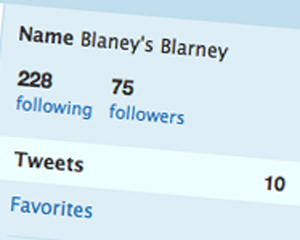Yesterday we noted how the UK High Court served its first order via Twitter, saying that the social website and microblogging service was the best way to reach an anonymous Tweeter who had been impersonating someone.
Solicitors Griffin Law sought the injunction against @blaneysblarney claiming that it was impersonating the solicitor Donal Blaney – the owner of Griffin Law – who uses the name Blaney’s Blarney for his right-wing political blog.
His barrister, Matthew Richardson, is triumphing it as the ‘Blaney’s Blarney order’ – a success in the battle against anonymous abuse online, he said.
But it also raises questions about the threat to freedom of speech caused by such an order. Cynics might also suggest such a high-profile move was simply good PR for Blaney’s firm. Journalism.co.uk put these questions to Donal Blaney this morning:

Bypassing Twitter to court
Blaney said he chose not to contact Twitter but go straight to court, because the microblogging service is like the ‘very worst ISPs were 10 years ago’, who said ‘oh it’s not our fault, we just provide the platform’.
“Well, the court says ‘no chaps. It is your fault’. You are a publisher and you are just as liable as if the Daily Telegraph published something,” argued Blaney.
When he approached the service during another case – his client wanted to have an account removed – he had found Twitter unhelpful: “It took a week for the offending account to be taken down – which is outrageous. Getting hold of Twitter is impossible. They don’t provide a phone number. There is a fax number that no one replied to.”
High risk strategy, but good PR
“Ok yes, I am getting good coverage on this,” Blaney admits. “But equally if it had gone wrong people would have called me a prat.”
Blaney is not convinced it will win him additional clients: “Unfortunately the way the legal profession works, even though I might like to think ‘oh great on the back of this every celeb or sportsperson who is being impersonated is going to come and use my firm’, I know they’re not.
“I was resigned to having to waste a week of my life chasing Twitter to get them to take it down. I thought it was worth giving it a go in court. I’m at risk on damages.”
[Cross-undertaking damages: applicant will be required to pay the damage caused to the defendant arising from the grant of the interim injunction, if it turns out the injunction should not have been ordered in the first place]
Bullying not parody, says Blaney
Blaney said it was not an instance of satire or parody in his view: “The grounds under which I got the order were breach of copyright and passing off.” And the court agreed, he says, or he wouldn’t have got the order.
“It is bullying, that is precisely what it is: to set up an account in someone else’s name. To pass yourself off as them, to contact your friends and pretend to be them. To use your image, to use the name of your blog, to deliberately and maliciously to screw with someone else’s head. That’s bullying: exactly the same concept as flushing someone’s head down a toilet or anything else,” he claimed.
He said he advised others – and names at least one celebrity currently being mocked in a similar fashion – to think about similar action:
“If it’s a situation where someone’s being parodied this is not the route to pursue; if it’s a situation where someone is being stalked or bullied or harassed, or having their intellectual property rights infringed, I would encourage them to do this.”
Blaney believes harassment ‘trumps’ the right to freedom of speech:
“There are two other things that trump freedom of speech: right to [intellectual] property and infringing copyright,” he argues.
“There is a boundary which gets overtaken – harassment, the malicious causing of harassment and distress. There’s no such thing as unfettered freedom of speech.”
And what next?
The account holder must obey the court order, or will be in contempt of court. But what Blaney’s next step is, he doesn’t know. “Will this person just take the site down and not reveal their identity?” he asks.
If it is closed, that would only solve it ‘up to a point’ he claims, adding ‘but it depends if I can be bothered to go after the individual behind it.’
Journalism.co.uk has attempted to contact @blaneysblarney for further comment (via Twitter.)
What do you think? Was the court correct to issue such an order? What are the implications for online anonymity?
